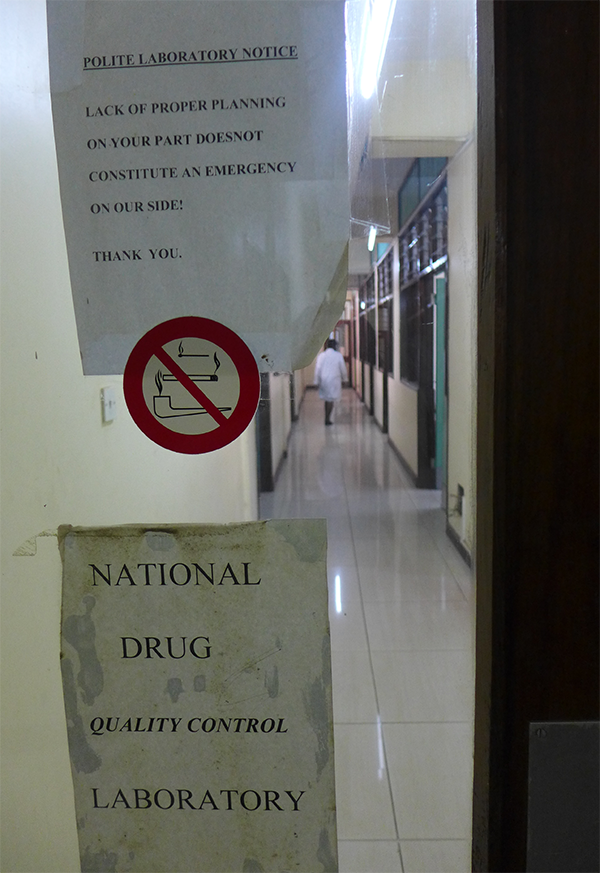+ 123 456 7890
Drug Quality Assurance and Monitoring
Advancing countries’ abilities to test medicine quality and sharing test results with key stakeholders and consumers are important strategies to combat SSFFC antimalarials. A number of technologies are available that national agencies can use to test the quality of medicines without having to send samples to international laboratories. The Promoting the Quality of Medicines (PQM) Project, managed by the U.S. Pharmacopeial Convention (USP) with funding from the U.S. Agency for International Development (USAID), trains and equips regulatory authorities, quality assurance professionals and pharmaceutical representatives to test and evaluate medicine quality. The PQM project has four Official Medicine Quality Control Laboratories in sub-Saharan Africa in Ethiopia, Ghana, Nigeria and Kenya. The USP-Ghana has launched the Center for Pharmaceutical Advancement and Training (CEPAT), which has trained almost 200 African professionals on a number of quality control and assurance topics. Learn more about USP’s work in promoting quality by watching this video:
The World Health Organization (WHO) has created a surveillance and monitoring system for tracking and reporting suspicious medicines by its member states, featuring a web-based Rapid Alert System and Rapid Alert Form. (Learn more about SSFFC WHO activities .) The system issues alerts about SSFFC malaria medicines. These alerts can be found on the Rapid Alert website. Organizations like Pharmaceutical Security Institute, Worldwide Antimalarial Resistance Network (WWARN) and U.S. Pharmacopeial Convention (USP) also track the presence of SSFFC malaria medicines, and have developed online tools to share findings of quality reports from PQM, drug companies and others. ACT Consortium has also focused recent research on quality medicine, testing over 10,000 samples for medicine quality studies in six malaria endemic countries.
Additionally, the Global Health Assurance Partnership (GHAP) is a new Swiss-based association created to expand upon the success of the Joint Interagency Task Force (JIATF). JIATF emerged as a Global Fund-established Special Initiative designed to proactively address the challenge of illicit medicines using a data-driven approach. The coalition of international agencies included Interpol, USAID and United Nations Development Program (UNDP). Like JIATF, GHAP now provides technical assistance and capacity building to national government agencies mandated to respond to pharmaceutical crime. GHAP also expands and scales up efforts to combat the trade in falsified and stolen medicines beyond the initial focus on antimalarial medicines to include other essential medicines and health products at risk of theft and falsification. GHAP offers three core services: Market Assurance Reviews (MARs) providing a detailed picture of the scope and scale of stolen and falsified medicines within a particular country; Supply Chain Assurance Reviews (SCARs) providing end-to-end assurance that subject supply chains are conforming without leakage; and Technical Assistance and Capacity Building to enable National Medical Regulatory Agencies (NMRAs) and other national specialist agencies.
Private companies like mPedigree, PharmaSecure and Sproxil have developed mobile verification technologies that allow consumers to verify the quality of medicines through text messaging. Using short message service (SMS) technology, consumers are able to text a serial number found under a scratch-off surface on the medicine packaging. The consumer will receive a text message from the manufacturer letting them know that the medicine is genuine. If the medicine is not linked to a registered manufacturer, the consumer will receive a notification that the medicine is not genuine, with instructions for reporting to the authorities.
Furthermore, quality assurance research initiatives also help to improve improve data collection and dissemination and promote data-driven decision-making. For example, ACTwatch is a multi-country research project implemented by Population Services International, which aims to provide timely, relevant and high quality antimalarial market evidence. The goal of providing this market evidence is to inform and monitor national and global policy, strategy and funding decisions for improving malaria case management. Nearly 50 outlet surveys have been conducted since 2008 within 12 project countries in sub-Saharan Africa and the Greater Mekong sub-Region. ACTwatch conducts outlet surveys on a range of sources, including public and private health facilities, community health workers, pharmacies, drug stores, general retailers (e.g., grocery stores, shops and market stalls) and mobile drug vendors, and is able to report on the total market for malaria medicines and diagnostics, including the types of outlets distributing antimalarials in each context. The results of these surveys reveal the availability, price and market share reported for quality-assured and non-quality-assured ACTs.


